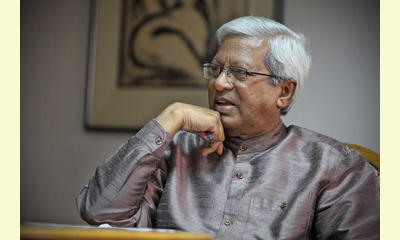|
|
Bangladeshi Pioneer Invests in Women From the ‘Ultra-Poor’
un article par Barbara Crossette, PassBlue (abridged)
Fazle Hasan Abed runs the world’s largest
nongovernmental development organization. He has
garnered numerous international prizes, honorary
degrees, very important friends and a British
knighthood. Yet in the United States, Abed’s
successes, won through a creative self-help
program centered on mothers and their families,
are virtually unknown.

Fazle Hasan Abed, the founder of BRAC, a 40-year-old organization dedicated to helping the poorest of the poor in 11 countries, reaching 135 million people.
click on photo to enlarge
So here is his story, and BRAC‘s.
The four-decade old organization Abed founded
began work as the Bangladesh Rural Advancement
Committee in country villages in the early years
of Bangladeshi independence from Pakistan in 1971.
Now, having shortened its name to erase that
small-scope image, BRAC has projects in 11
countries, reaching 135 million people.
It has evolved into much more than a rural
development organization, with banks for the poor,
38,000 schools worldwide, a university, research
projects in agriculture and aquaculture to meet
the effects of climate change and a corps of
nearly 100,000 community health workers who reach
down to the small homes of people with the fewest
resources, material or human. On all fronts, BRAC
invests in people too poor to benefit from most
aid programs, even microfinance. Many stay alive
on as little as 70 cents a day or less.
In 2007, a BRAC USA opened in New York to support
the global work of its Bangladeshi parent. Its
president and chief executive is Susan Davis, a
widely respected advocate for women in development
who encountered Abed and BRAC while based in
Bangladesh for the Ford Foundation. She later
served as head of WEDO, the Women’s Environment
and Development Organization, among other offices
she has held.
In Bangladesh, BRAC supports silk production,
traditional unique embroidery and other local
crafts of high quality, sold through its Aarong
stores. But unemployed women at the heart of
family life are the main focus of the latest
campaign to crack the wall of barriers that keep
the “ultra-poor” trapped in bare-subsistence
lives, however hard they work.
“The poverty of women is one of the most difficult
questions, but one of the most important
questions,” said Abed, who was born in 1936 in
what was then British colonial East Bengal (later
East Pakistan). Speaking in an interview during a
visit to New York, he described how BRAC starts
with a small cash grant, enough to buy a two-year
breathing space for a mother and her children and
access to basic public services, including a
family planning program that has helped the
country lower its fertility rate and raise the
level of maternal health. It is, in reality, an
investment in poor families. . . .
“In Bangladesh, we have worked with about 1.5
million families,” he continued. “Over a two-year
period, our investment has been about $300 per
family. What we are trying to measure is what
happens to this family. How many graduate after
two years to a growth path? After five years, we
find that almost 80 percent of the families have
improved their conditions.” The Economist magazine
has described BRAC as “the largest, fastest
growing nongovernmental organization in the world
— and one of the most businesslike” . . .
[Note: Thank you to Janet Hudgins, the CPNN reporter
for this article.]
|








|
DISCUSSION
Question(s) liée(s) à cet article:
Helping the poorest of the poor help themselves, if millions took it up, could it be the foundation of a just world?
* * * * *
Commentaire le plus récent:
The following article by a Japanese professor introduces the importance of the movement of World Social Forum and the role of Japan in Iraq. It was sent to us by Takehiko ITO of CPNN Tokyo.
POINT OF VIEW
Kinhide Mushakoji: World forum in Mumbai shows Japan the way
The world does not need the so-called global standard that serves only to widen the gap between rich and poor. It was wrong of U.S. President George W. Bush to invade Iraq and cause suffering to innocent people for the weapons of mass destruction that didn't exist.
As many as 120,000 people who shared these convictions gathered in Mumbai, India, for the World Social Forum in January.
Neo-liberal economics and neo-conservative supremacy render it impossible for people to live safely, and most people accept this as fate. . ... continuation.

|
|









